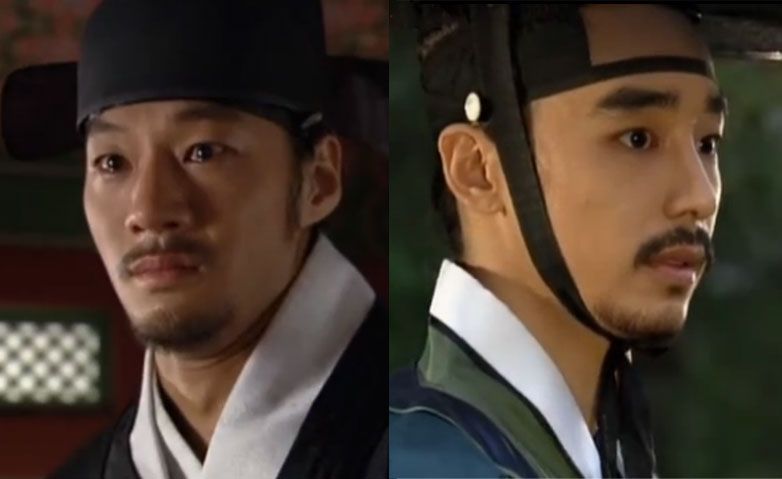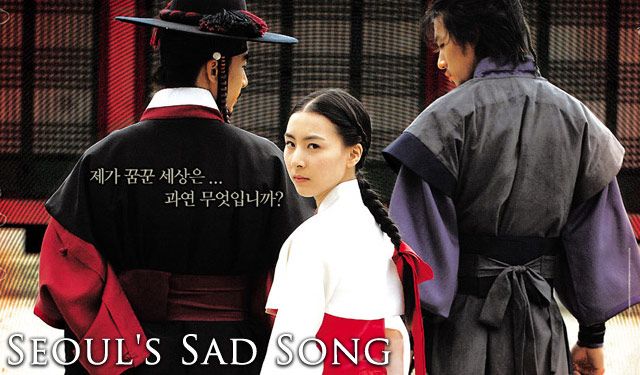Seoul’s Sad Song/Conspiracy in the Court
한성별곡5/10
I must say, I was
really looking forward to this drama.
Hearing it win great acclaim amongst a cultish following (despite the low
ratings when it was on air), and I was rearing to go. Plus, it was short! Only 8 episodes
long. Seemed like a quick boost for my
dwindling drama-watching habits. For a
quick recap, I’ve only managed to complete some extremely light K-drama
entertainment of late (Flower Boy Ramyun
Shop and Full House Take 2), and
the endlessly long Flames of Desire is
fantastic, but highly un-marathonable.
This is where fusion-sageuk-thriller Seoul’s Sad Song was supposed to come in and save the day. Only, it didn’t. What on earth happened!?
First I was lost in the history of the era. I’m a history graduate though, so that’s never really stopped me before. Quick Wikipedia checklist of the drama’s main overarching political period? Check. Okay, then they lost me with the economics of era. Mercantile affairs, and the political ramifications of possibly re-locating the capital? I guess I can sort of see how that could affect things. The problem with the drama’s plot-line however, is that all these threads (politics, and history and economics are interwoven with great, gaping thread lines around the show’s main “conspiracy” plot, and haphazardly intermingled with the love triangle/square. I mean, I know Seoul in historical times was small, and everyone who’s anyone probably knows everyone worth knowing, but me, the viewer, had no idea who anybody was, or which side they were on. For an 8 episode drama, there was so much going on that I basically couldn’t keep up with my list of who’s who.
First I was lost in the history of the era. I’m a history graduate though, so that’s never really stopped me before. Quick Wikipedia checklist of the drama’s main overarching political period? Check. Okay, then they lost me with the economics of era. Mercantile affairs, and the political ramifications of possibly re-locating the capital? I guess I can sort of see how that could affect things. The problem with the drama’s plot-line however, is that all these threads (politics, and history and economics are interwoven with great, gaping thread lines around the show’s main “conspiracy” plot, and haphazardly intermingled with the love triangle/square. I mean, I know Seoul in historical times was small, and everyone who’s anyone probably knows everyone worth knowing, but me, the viewer, had no idea who anybody was, or which side they were on. For an 8 episode drama, there was so much going on that I basically couldn’t keep up with my list of who’s who.
 |
| At least I figured out who these guys were... by the end of episode 1. |
I think Seoul’s Sad Song was hinting at some
loftier aspirations: namely, that not
every sageuk drama out there is just
about the king and his ministers. The welfare
of the Joseon people, the advancement of well-deserving baseborn officials, and
the dreams of these types of people also matter and can make a difference. Unfortunately, all this was lost on me. For a conspiracy driven thriller, this whodunit
story was chock full of inspirational back stories (that should have warmed me
to the characters), chilling twists (that moved me to boredom), and enough
metaphorical court language that literally drove me to tears. The following
example comes right as a BIG revelation surrounding the king’s secret will has
just been unveiled:
A : “When the wintry gales swelter us, he said that brushes would be swayed by the wind.”B: “So… did you find any unyielding brushes?”A: “In the palace, there was not a single one left.”C: “You insolent slattern! How dare you mutter such insidious drivel!?”
You insolent writers, how dare you not write more clearly!?!
Maybe I’m lazy, or
just plain incompetent, but everything in this drama seemed wasted on me. Though,
if there’s anything I’ve learned from watching this sageuk (and others for that matter), it’s that women in the palace are more to be feared than the
men. Also, by the state of the
practically non-existent but completely soundproof-less walls on traditional
Korean homes (of rich and poor alike), it’s amazing that any secrets are ever
kept.
Did I say I hated
everything about this drama? Well, it wasn’t all bad. The scenery was nice, I
sincerely liked parts of the OST, and this dude below was fun to watch as well. Oh, he’s no big character; just a henchman
who followed around after his master, brandishing his sword at each enemy to cross
his path. Maybe I liked him, because
unlike everyone else, he rarely spoke more than two words, so he never had
anything to confuse me about.
 |
| Glare at me all you want, just please, don't speak and ruin all of my fantasies. |


It sounds like the dialogue fell victim to historical-fiction-ese, the silliest of the world's speech impediments.
ReplyDeleteBummer about this drama not being good. I've read some really positive reviews of it, but they're all posted by people who like shows that I consider to be boring and talky =X I guess that's one to scratch off the list.
I just decided to start a new drama and am torn between rewatching Coffee Prince or going with Can We Get Married. Such a tough call...the trusty old favorite or a possible new love? (It's like a Kdrama love triangle, only with television shows!)
Maybe watching this needed a different mood, then again I watched this slowly over two weeks, and never found the right mood. Oh well.
DeleteI have a love-hate relationship with Can We Get Married right now. First I loved it, then I dropped it, then I revived it, loved it once more, and now it's officially on hold. I think it's making me bipolar. I think it's genius. I also want to murder half of the female characters (at least in the older generation). I think it will be a supremely slow watch for me, because I really do want to finish it! It's just so different, I'm not sure how to watch it...
Of course, you can never go wrong with a good Coffee Prince rewatch ;)
Haha you just made me laugh so hard! That's disappointing to hear because I had considered watching this at some point.
ReplyDelete